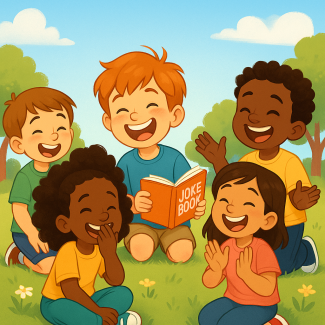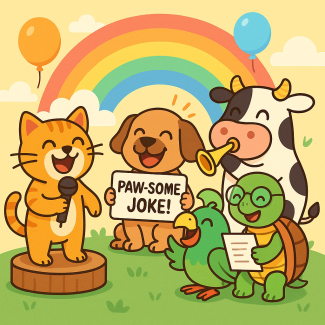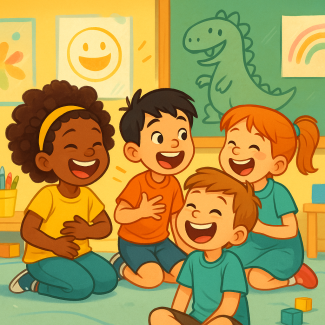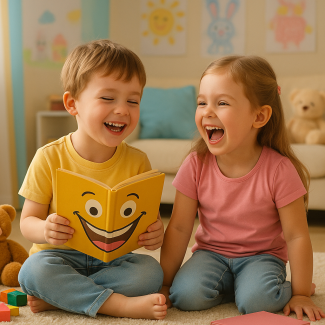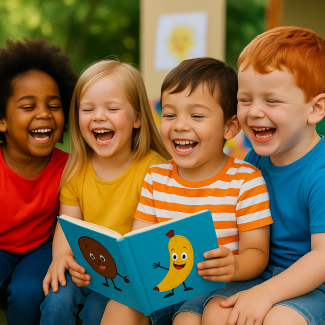
Funny jokes for kids that 5-year-olds will love
What are the best clean and simple jokes for 5-year-olds?
Laughter is one of the earliest ways young children connect with the world. For 5-year-olds, jokes are more than just silly fun—they’re part of how they explore language, develop social skills, and express creativity. But not all jokes are created equal for this age group. The best jokes for 5-year-olds are short, clear, and packed with playful surprise. They often revolve around animals, food, everyday situations, and familiar objects—things children can easily imagine and relate to.
The magic lies in their simplicity. A clever twist of words, a goofy image, or a question with a funny answer can spark genuine giggles in even the shyest little one. Whether you’re a parent, teacher, or babysitter, learning which jokes land best for this age group can turn ordinary moments into laugh-out-loud fun.
Why laughter is so important for young kids
How jokes help 5-year-olds grow emotionally and socially
Children at five are soaking up the world around them. They're asking questions, making connections, and discovering humor. Jokes help them engage in this process in a joyful way. Here's why the right kind of humor matters:
- Builds confidence: When a child tells a joke and gets a laugh, it reinforces their ability to communicate and connect with others.
- Supports language learning: Jokes rely on understanding double meanings, timing, and sentence structure—all important parts of language development.
- Fosters imagination: A joke about a dancing banana or a talking dog invites a child to visualize the unexpected. That kind of mental play boosts creativity.
- Encourages social bonding: Telling jokes is often a shared activity. It brings kids together, helping them feel part of a group or family.
Humor at this age is a tool for learning, and sharing funny jokes for children helps them express themselves in a positive, healthy way.
What makes a joke funny to a 5-year-old?
How to match joke styles to a preschooler's sense of humor
Five-year-olds live in a world of curiosity and wonder. Their idea of what’s funny is still forming, and it’s rooted in the familiar with a twist. Here's what to look for in age-appropriate jokes for preschoolers:
- Predictability with a surprise ending: Kids this age love patterns but are delighted by unexpected answers.
- Playful sounds: Words that rhyme or have silly sounds can make a simple sentence hilarious.
- No complicated logic: Puns or jokes that rely on abstract reasoning might go over their heads.
- Friendly characters: Animals, food, toys, and family members are go-to favorites for joke topics.
For example, a joke like “Why did the cow cross the road? To get to the moo-vies!” is a hit because it’s based on something familiar (a cow) and ends in a silly pun (moo-vies).
Why parents love telling jokes to their 5-year-olds
The joyful benefits of making kids laugh every day
If you've ever seen a 5-year-old dissolve into giggles over a goofy punchline, you already know the reward. But there’s more to it than just a laugh. Telling funny jokes for kids aged 5 becomes a cherished part of daily routines.
Parents often tell jokes at bedtime, on car rides, or while waiting in line. These moments of laughter build emotional bonds and create lasting memories. For adults, sharing a joke also provides insight into a child’s world—what they find amusing says a lot about how they see things.
Best of all, laughter breaks tension. A joke after a tough day at school or a grumpy morning can transform the mood completely. It’s a simple, powerful tool in parenting—and it doesn’t cost a thing.
How to introduce humor into everyday life with kids
Easy ways to weave jokes into routines and playtime
Creating a playful environment isn’t about forcing laughter—it’s about inviting it. Here are some ways to naturally include kid-friendly jokes in daily life:
- Story time twist: Add a silly line to a familiar book and watch your child catch on.
- Snack time giggles: Tell a food joke while packing lunch (“Why did the tomato blush?”).
- Bathroom mirror fun: Practice faces or silly sounds and invent your own jokes together.
- Joke-of-the-day board: Write a new joke on a chalkboard or sticky note for morning smiles.
- Imaginative play: Use puppets or toys to act out mini skits that end in a punchline.
When humor is part of the home rhythm, it helps children feel secure, creative, and connected. It becomes a tool for expression, not just entertainment.
Why this topic brings joy to families and children alike
There’s something uniquely heartwarming about a child’s laughter. It’s genuine, uninhibited, and contagious. Learning the best clean jokes for 5-year-olds means unlocking a shared language of fun—a way for grown-ups and kids to delight in each other’s company.
In a world often filled with screens and stress, simple laughter is a powerful antidote. It encourages mindfulness, emotional openness, and even better sleep. When children laugh, they're not just being silly—they’re thriving. And when parents or caregivers join in, the moment becomes even more meaningful.
For many families, joke time becomes a treasured tradition. It’s a pause in the day to celebrate imagination, togetherness, and the pure joy of being a kid.
Feel free to share your favorite kid-approved joke with us—or try one out during your next bedtime story. You might be surprised how much fun you have, too.
30 hilarious and simple jokes for 5-year-olds to enjoy
Classic jokes for preschoolers that never fail to get a giggle
Children at age five appreciate humor that’s easy to understand and fun to repeat. The following funny jokes for 5-year-olds are designed with their world in mind—familiar characters, surprising punchlines, and just the right amount of silliness.
- Why did the teddy bear say no to dessert?
Because it was already stuffed! - What do you call a dinosaur that’s sleeping?
A dino-snore. - What did the banana say to the dog?
Nothing. Bananas don’t talk! - Why did the duck cross the playground?
To get to the other slide. - What do you get when you cross a snowman and a dog?
Frostbite. - What did the cow say when it heard a joke?
Moo-ha-ha! - Why don’t elephants use computers?
Because they’re afraid of the mouse. - What’s orange and sounds like a parrot?
A carrot. - What do you call cheese that’s not yours?
Nacho cheese. - Why did the cookie go to the doctor?
Because it was feeling crummy. - What do you get when you put three ducks in a box?
A box of quackers. - What kind of key opens a banana?
A monkey! - Why did the apple stop in the middle of the road?
Because it ran out of juice. - What did the bee say to the flower?
“Hello, honey!” - Why can’t your nose be 12 inches long?
Because then it would be a foot! - What kind of tree fits in your hand?
A palm tree. - What’s a ghost’s favorite fruit?
Boo-berries. - What do you call a sleeping bull?
A bulldozer. - What does a cloud wear under its raincoat?
Thunderwear. - Why did the frog take the bus to work?
His car got toad! - What game do cows like to play at parties?
Moosical chairs. - How do you make a tissue dance?
You put a little boogie in it. - What kind of music do mummies listen to?
Wrap music. - Why did the squirrel bring a suitcase?
It was going on a nutty vacation. - What did one plate say to the other?
Lunch is on me! - Why did the bicycle fall over?
Because it was two-tired. - What do you call a bear with no teeth?
A gummy bear. - What is fast, loud, and crunchy?
A rocket chip. - What kind of vegetable likes to look at animals?
A zucchini. - Why did the chicken join the band?
Because it had the drumsticks!
How these jokes support early development and communication
Encouraging language skills through simple humor
Telling simple jokes for 5-year-olds isn’t just about getting laughs—it’s an engaging way to encourage verbal skills and creative thinking. At this age, children are developing their understanding of wordplay, sequencing, and punchlines. A well-timed joke helps them experiment with sounds and meanings in a playful setting.
When kids repeat a joke, they’re reinforcing their vocabulary, tone, memory, and timing. Even silly jokes with groan-worthy puns promote narrative structure and storytelling. These are key skills that influence both reading comprehension and verbal confidence.
Teaching empathy and social skills with funny content
How laughing with others builds emotional intelligence in children
Sharing kid-friendly jokes teaches children more than language—it encourages empathy. By noticing what makes others laugh, kids learn to read expressions, respond to feedback, and adjust their tone. This is especially valuable during playdates, classroom interactions, and family time.
Laughter is a bonding experience, and jokes often become the beginning of storytelling, character building, or even dramatic play. When a child tells a joke and sees someone laugh, it validates their ability to entertain and connect, boosting their self-esteem.
Making joke-telling a family tradition
Fun ways to incorporate jokes into daily routines
Turning jokes into a part of family rituals adds warmth and connection to everyday activities. Here are a few ways to keep clean and funny jokes for kids front and center in your home:
- Morning mood-lifters: Start the day with a new joke during breakfast or on the drive to school.
- Dinner table laughs: Let each family member take a turn telling a joke during meals.
- Joke jar: Keep a jar filled with folded-up jokes and let your child pick one at bedtime.
- Creative crafts: Write out jokes on cards and decorate them together as a rainy-day activity.
- Sibling silliness: Encourage older siblings to help younger ones memorize and perform new jokes.
By making humor part of your family culture, you create space for expression, emotional release, and shared joy.
Why parents and teachers recommend these jokes
Positive entertainment with educational benefits
For parents and educators alike, jokes for young children are a smart and effective form of entertainment. They offer screen-free engagement, encourage social interaction, and help children better understand the rhythm of conversation.
Unlike more passive forms of amusement, joke-telling is active. It gets children thinking, speaking, and responding. Teachers often use short jokes during transitions in the classroom to re-engage attention and ease anxiety. Parents turn to jokes as icebreakers when meeting new friends or relatives.
The best part? Kids don’t even realize they’re learning. They just know they’re having fun—and that’s the best kind of education.
Helping shy children open up with humor
Using playful conversation to build confidence
Some children are naturally more reserved, especially in new environments. Silly jokes for 5-year-olds offer a safe and pressure-free way for these kids to participate in conversation.
Because jokes are short and repetitive, they don’t demand the same verbal risk as storytelling or answering a question. The child knows what’s coming, which builds a sense of control and comfort.
When a joke gets a good reaction, it can inspire more attempts, leading to stronger social skills and reduced anxiety. That’s why many speech therapists and child development experts recommend humor-based play as part of early childhood growth strategies.
Exploring the types of humor most appealing to 5-year-olds
Breaking down joke styles by age-appropriate themes
While humor evolves with age, 5-year-olds tend to gravitate toward a few reliable joke categories:
- Animal jokes: Kids connect easily with animals, making these a frequent hit.
- Food-based humor: Bananas, cookies, and pizza all lend themselves to laughable scenarios.
- Silly sound jokes: Anything involving rhyming, repetition, or funny noises is a winner.
- Role reversal: Talking objects or animals behaving like humans add unexpected twists.
- Mild absurdity: Jokes with wild exaggerations or impossible ideas tickle their imagination.
Understanding these preferences helps parents, teachers, and caregivers pick material that matches a child’s interests and keeps the laughter going.
Creating joyful experiences through shared humor
When a 5-year-old lights up with laughter, it changes the energy of the whole room. These early experiences with humor are foundational—they teach children how to observe, participate, and imagine. And when adults take the time to share funny jokes for kids, they’re investing in something far greater than a giggle.
They’re building trust, modeling language, and making children feel seen and valued. With the right set of jokes, any ordinary day can turn into an extraordinary moment of connection and joy.
If you know a child who needs a laugh today, try sharing a few of these jokes out loud. The smile you get in return might be the highlight of your day.

